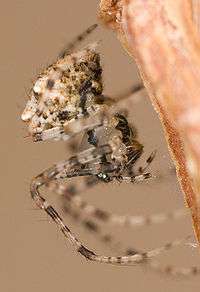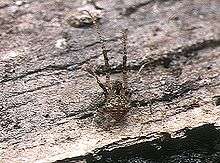Pirate spider
| Pirate spiders | |
|---|---|
 | |
| Female Ero aphana | |
| Scientific classification | |
| Kingdom: | Animalia |
| Phylum: | Arthropoda |
| Subphylum: | Chelicerata |
| Class: | Arachnida |
| Order: | Araneae |
| Infraorder: | Araneomorphae |
| Family: | Mimetidae Simon, 1881 |
| Genera | |
|
See text. | |
| Diversity | |
| 12 genera, 152 species | |
 | |
Pirate spiders, members of the family Mimetidae, are araneomorph spiders which typically feed on other spiders.
The family Mimetidae contains roughly 200 species divided among 12 genera, of which Mimetus and Ero are the most common. Mimetids are usually yellow and brown and are usually 3 to 7 mm long. Mimetids can be recognized by the rows of spine-like hairs on their long front legs; the rows consist of a long spine, followed by a series of progressively shorter ones.
Mimetidae usually hunt by picking at the strands on their prey's web to simulate the movements of either a trapped insect or a potential mate. When their prey comes to investigate, they are instead captured and eaten. Some mimetids have been observed to feed on insects as well. The spider-feeding habit presents problems in mating, and little is known about how the males court females to avoid being eaten. However, some male mimetids in the genus Gelanor, found in South America, have enormously long appendages which they use to inseminate females.

Taxonomy
The Mimetidae are sometimes taxonomically grouped in the superfamilies Araneoidea or Palpimanoidea.
Genera
The categorization into subfamilies follows Joel Hallan's Biology Catalog.
- Gelaninae Simon, 1881
- Melaenosiinae
- Mimetinae Simon, 1881
- Arocha Simon, 1893 (Peru, Brazil)
- Australomimetus Heimer, 1986 (Australia)
- Ero C. L. Koch, 1836 (Palearctic, Africa, South America, USA, Asia, Australia)
- Mimetus Hentz, 1832 (worldwide)
- Phobetinus Simon, 1895 (Vietnam, Sri Lanka)
- Reo Brignoli, 1979 (USA, Kenya)
- Oarcinae Simon, 1890
- Gnolus Simon, 1879 (South America)
- Oarces Simon, 1879 (South America)
See also
References
- Platnick, N.I. & Shabad, M.U. (1993). A review of the pirate spiders (Aranae, Mimetidae) of Chile. American Museum novitates 3074. Abstract - PDF (12Mb) (with color pictures of O. reticulatus male and female, G. cordiformis m/f, G. blinkeni f, G. zonulatus f, G. spiculator f, H. collusor f; new description of G. blinkeni)
External links
| Wikimedia Commons has media related to Mimetidae. |
- Arachnology Home Pages: Araneae
- Platnick, N.I. 2003. World Spider Catalog
- Iziko, Museums of Cape Town